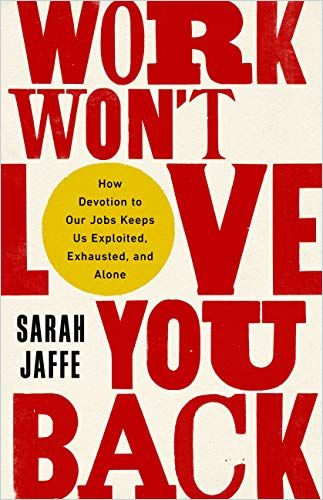“Work Will Never Love Us Back. Other People Will.”

I meet Sarah Jaffe in the cramped offices of her Italian publisher near the Piazza del Popolo in Rome. The walls are covered by bookshelves holding an eclectic mix of works including those by Angela Davis, Kurt Vonnegut and even a history of the Eurovision Song Contest written by the “world’s leading academic authority.” Jaffe is rushing between commitments on a very busy tour. During the last couple of days, she’s presented the Italian translation of her latest book, Il lavoro non ti ama (Work Won’t Love You Back) at the International Book Fair in Turin, and the night before she spoke at a venue in Rome. Her literary agent has managed to squeeze in this interview between a photo shoot and a lunch appointment. Soon she will be traveling to London and then back to New Orleans, where she has recently relocated to from New York. Despite this packed agenda, she’s all passion and energy. Her eyes are sparkling as she tells me about the warm reception she’s enjoyed during her book tour in Italy, meeting all sorts of wonderful people along the way. She clearly loves what she’s doing now.
Sarah, have you ever felt betrayed by a job that should have loved you back, but didn’t?
Sarah Jaffe: Well, when I first started in journalism, after I had been working in restaurants and doing other odd jobs for years, I really wanted it to be more than it was. And, actually, my first job in journalism was pretty good on many levels. We did a ton of work with very few people. My boss was wonderful, but we had to make this program on a budget, and we were all completely overworked and underpaid. I realized that a lot of these conditions were simply out of anyone’s control. It was a great fit and I had the best possible boss – but it very much took over my life. It was exhausting. Also, I had just moved to New York, and so a lot of my social life was based on people I was meeting through work – which, come to think of it, is still true.

There’s this famous saying, “Do what you love, and you’ll never actually work a day in your life.” What’s wrong with that notion, and why shouldn’t we love our work – or be grateful for having it?
I’m actually agnostic on whether people should love their jobs. I think the point of calling the book Work Won’t Love You Back instead of Don’t Love Your Job is exactly that. Because it won’t, right? Companies don’t exist to make us happy. They exist to make money. And humans will always be subordinated to that. Even if you have the best boss in the world who is desperately trying to make her small nonprofit media organization viable, she is still going to be constantly under pressure from the people who give her the money she needs to operate.
In Jaffe’s introduction to her book, she calls herself the “poster child” for work in today’s economy: She’s 42 years old, has no family or property and doesn’t get paid vacation, let alone company-sponsored health insurance or retirement benefits. As a freelancing journalist and writer, she makes around 15,000 dollars less a year than the average woman of her age and education level. At the same time, she and millions of other people around the world with similar or much worse working conditions are told that they should look for joy, meaning and fulfillment in their jobs.
Why was the labor-of-love myth created in the first place?
I think that we are being pressured into loving what we do to make a living, in order to be more loyal and better exploited.
Sarah Jaffe
It really came home to me at the Turin Book Fair, which is held at the former Fiat Factory. I mention it in the book as this famous site for organizing and strikes in the 1970s, where workers were demanding something more meaningful in their lives than a boring job on an assembly line for 40 years. But that demand got assimilated and spat back out to us: “Okay, now you have a job that is exciting and you feel creative and you feel whatever, but in return for all that feeling you don’t have any of the security that those workers in that factory had.”
Jaffe doesn’t believe that there’s anything to romanticize about the toils of the industrial age. But she’s convinced that the labor of love is a con. In her book she chronicles in fascinating detail how one form of exploitation transformed into another, fleshing out the history of active labor struggle and its radical, inspiring thinkers. But her focus is on the people in the service, creative and teaching industries who were forced into the labor-of-love trap and managed to break free from it through organizing, unionizing and the love of their fellow human beings.
Who are these people?
They include domestic workers, teachers, artists, adjunct professors, interns, game designers and professional athletes: people like Adela Seally, a mother of seven from the Caribbean island St. Lucia. She works as a nanny in New York City and was forced to move in with her employer’s family during the COVID-19 pandemic, so she wouldn’t be exposed to the virus on an hour-long public transport commute to the wealthy suburb of her employers. Seally had to leave her younger teenage kids alone in their apartment in the Bronx all week, hoping they would do their schoolwork and not get into trouble while she was taking care of other people’s children.
You also tell the story of Ray Malone, a London-based performance artist and single mother, who was barely scraping by on Universal Credit, the remnant of the UK’s welfare scheme, and was pressured into taking a full-time position while also taking care of her young child.
Love is “women’s work.” It’s women who continue to do most of the unpaid work of taking care of others. Yet Ray realized that for a working-class artist like herself, it was simply impossible to square that circle: Failing to care for your child makes you a bad mother, while failing to provide for your child makes you a “welfare queen” or just a bad person, period. She has a graduate degree in theater, yet making the sort of money that would have allowed her to pay for child care in London is simply out of the question. Ray was just texting me this morning.
What happened?
She went to a talk about class in the theater world the other day, where mostly middle-class people were discussing the lack of working-class perspectives in the theater. Eventually, Ray stood up and said, “How are people like me going to make a living at this?” The answer was, “Oh, we’ll encourage more working-class people to come to the theater,” to which Ray said, “Do you understand that people can’t afford to eat right now? They don’t have money for theater tickets!”
You also make a point of telling your stories from the workers’ rather than the elite’s point of view. Why?
Journalism is a field where fewer than 10% of new workers coming in are from working-class backgrounds.
The expectation to perform so-called ‘hope labor’ – that is working for free to, one day, get that precious job that is worth loving – is making sure that most of those who simply can’t afford hope are kept out.
Sarah Jaffe
Many employers also use the trick of calling their workplace family. I know a programmer who worked for a game company that brands itself as “fampany”, only to be fired for being too much of a squeaky wheel about diversity issues and union rights. That was after being told that he’d joined the family…
What do you think of the concept of work-life balance then?
Even the need for people to have time off is justified with an increase in productivity these days. I want to justify free time simply by saying that we are human, and we only get one life! When people talk about work-life balance, what they mean – at least in the case of women – is work and your kids, work and your family. It does not actually mean work and spending time on your own hobbies, going to the movies with friends or lying in the park watching birds.
In her book, Jaffe offers countless stories of individuals who stood up and won fights against discrimination and untenable working conditions as well as for the right to unionize. They resisted their employers’ attempts to pit workers against one another and created new public spaces in which to meet like-minded people, bond with them and do something, anything together, which to her is the lifeblood of labor organizing.
What makes you so optimistic about the prospect of fundamental change?
I’m not saying that everything is going to be great now. It’s an uphill battle. But I think that it’s becoming clearer that we are in a fight here, and that Elon Musk, Jeff Bezos and others like them are not your friends, and they are certainly not your family. It is a political question of whether the world should be organized exclusively around wage labor, or whether there are better ways we could spend our time – particularly now, with the looming climate catastrophe. The way we work is something we really have to take time to think about, because it’s killing us and it’s killing the planet.
In the conclusion to her book, Jaffe quotes the UK think tank Autonomy to make her point: “Provided current levels of carbon intensity of our economies and current levels of productivity, how much work can we afford?”
On the other hand, there is an apparent lack of work in a place like Italy, where a quarter of young people between the ages of 15 and 24 are unemployed, with that number reaching a staggering 50% in parts of southern Italy.
I think we must question the basic premise that we only deserve to live if we work. Why should that be the case? Rather than solving the unemployment problem by getting young people into more unpaid internships so that they might one day get jobs that they love, we need to distribute the existing work more equitably. That could mean we all work less, for example, three or four days a week rather than five or six.
What if the older generation objects? After all, in a gerontocracy like Italy, they hold most of the power.
Everything in the world is a question of power. [Laughs.] And yes, you can use that as my last word!
About the Author
Sarah Jaffe is a Type Media Center fellow. She also wrote Necessary Trouble: Americans in Revolt and co-hosts Dissent magazine’s Belabored podcast.









